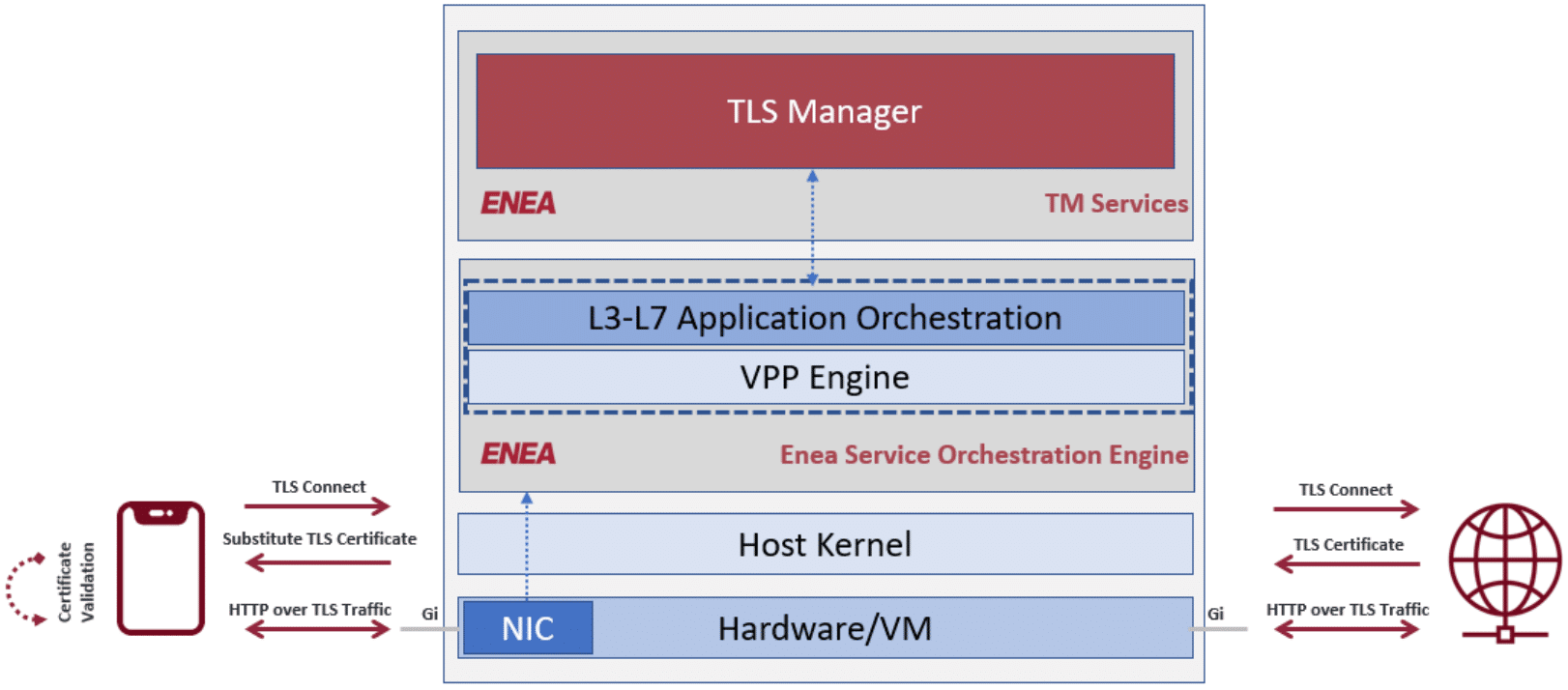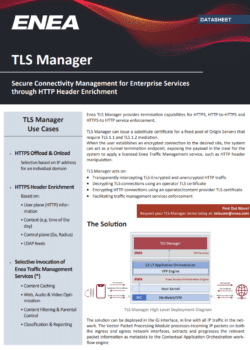TLS Manager
Secure Connectivity Management for Encrypted Traffic
Enea TLS Manager enables mobile network operators to maintain full visibility and control over HTTPS traffic through intelligent, secure termination of encrypted sessions. Built for high-performance environments, it facilitates advanced traffic management and HTTP header enrichment — helping operators deliver differentiated enterprise services, enforce policies, and integrate real-time context, even when traffic is encrypted.
TLS Manager supports secure traffic termination and inspection for the following key use cases:
-
HTTPS connections
-
HTTP-to-HTTPS redirection and enforcement
-
HTTPS-to-HTTP conversion (for policy-based offload or compatibility with legacy systems)
In today’s networks, these capabilities are essential to manage encrypted traffic effectively while still delivering value-added services, maintaining security policies, and ensuring a seamless user experience.
Benefits for Mobile Network Operators
- Maintain Visibility in Encrypted Environments: TLS Manager restores traffic-level insight and service differentiation in an increasingly encrypted internet landscape, allowing CSPs to sustain subscriber-aware services.
- Enable Secure and Policy-Compliant Header Enrichment: Operators can enrich HTTPS sessions with subscriber metadata — critical for enterprise authentication and localized service delivery — all within a secure, controlled framework.
- Seamless Integration with Traffic Management Functions: By connecting with the broader Enea Openwave Traffic Management suite, TLS Manager becomes part of a powerful ecosystem that enables optimization, control, and monetization of user traffic.
- Protect Subscriber Privacy: TLS Manager ensures that HTTPS mediation is selective and certificate-controlled, preserving trust relationships and complying with regulatory standards.
Why HTTPS Header Enrichment Matters
As HTTPS adoption grows, mobile network operators face new challenges in managing subscriber-aware services. Traditionally, HTTP Header Enrichment has allowed operators to seamlessly authenticate users, route traffic based on location or identity as well as personalize services and apply content policies. However, encryption hides these headers, making it difficult to enforce policies or enable enterprise-grade services. Enea TLS Manager solves this challenge by enabling selective and secure HTTPS mediation — decrypting traffic when appropriate, applying traffic management policies, and re-encrypting it before forwarding — all while remaining compliant with operator policies and privacy standards.
Key Use Cases Enabled by TLS Manager
HTTPS Header Enrichment for Enterprise Services
TLS Manager enables operators to enrich HTTPS traffic with unspoofable, real network identifiers — such as subscriber ID or IP address — in a secure and privacy-compliant manner. This is essential for:
- Seamless user authentication (e.g., for banking, telecom service apps or enterprise apps)
- Region-specific content delivery
- Customer-specific routing
Secure HTTPS Offload & Onload
Operators can selectively offload or re-encrypt traffic based on destination, source IP, or domain name. This supports:
- Legacy systems that require HTTP
- Policy-driven HTTPS-to-HTTP conversion for inspection
- Traffic re-encryption for onward delivery to third-party services
Context-Aware Policy Enforcement
TLS Manager can invoke enrichment and policy actions based on dynamic context, such as:
- Time of day
-
User session type (identified via HTTP data)
- Control plane signals (e.g., Gx, Radius)
- External databases (e.g., LDAP)
How Enea TLS Manager Works
TLS Manager acts on all relevant traffic flows to enable secure and intelligent service delivery:
-
Transparently intercepts both encrypted (HTTPS) and unencrypted (HTTP) traffic
-
Decrypts TLS traffic using operator-approved certificates
-
Re-encrypts traffic using operator or content provider certificates
-
Facilitates advanced traffic management services without compromising privacy

Key Capabilities of Enea TLS Manager
HTTPS Mediation and Termination
TLS Manager acts as a transparent TLS tunnel endpoint, securely decrypting HTTPS traffic and making the content visible to licensed Enea Traffic Management services. When a user initiates a secure connection (e.g., via a browser or app), the solution provides a CSP-approved substitute certificate, impersonating the origin server while preserving end-user trust and privacy.
Certificate Management
Operators can manually load substitute certificates for selected origin servers. TLS Manager validates each certificate against the user’s root store to maintain trust. This targeted approach ensures HTTPS header enrichment only occurs on predefined domains, minimizing exposure.
Selective HTTPS Mediation
Using IP address filtering (IPv4 or IPv6 ranges with CIDR notation), TLS mediation can be selectively applied to specific sites or services. This ensures that only traffic requiring enrichment or inspection is decrypted, optimizing resource use and aligning with regulatory policies.
Flexible Service Invocation
TLS Manager integrates with licensed Enea Openwave Traffic Management modules. Once HTTPS traffic is decrypted, these services can be invoked on a per-session basis for applications such as:
- HTTP Header Enrichment
- Video Stream Optimization
- Enterprise/Parent Control and Content Filtering
- Traffic Classification & Reporting
Comprehensive OAM Interface
TLS Manager includes a centralized Operations, Administration & Management (OAM) GUI, offering mobile network operators a single point of control across all deployed Enea Traffic Management products. This simplifies configuration, monitoring, and policy enforcement.
Deployment Architecture
The TLS Manager solution is deployed inline at the Gi interface, processing all IP traffic flowing through the operator’s network. It uses a high-performance Vector Packet Processing (VPP) module to intercept, inspect, and extract relevant metadata at both ingress and egress points. This data feeds into the Contextual Application Orchestration engine for real-time service logic execution.
Ready to be Network Smart about HTTPS?
Enea TLS Manager enables operators to enrich, route, and optimize encrypted web traffic — unlocking enterprise use cases while preserving trust and transparency. Reach out to our team to explore how Enea can help transform your network’s capabilities through secure, intelligent HTTPS Header Enrichment.
More Traffic Management Solutions
Enea Network Traffic Management Portfolio
Trusted By

Contact Our Experts
Would you like to know more about Enea’s software solutions for Network Traffic Management? Interested in discovering how our features could improve your specific use cases? Contact us to arrange a meeting with our network performance experts!
TLS Manager Data Sheet
Secure Connectivity Management for Enterprise Services through HTTP Header Enrichment

HTTP Header Enrichment Frequently Asked Questions
HTTP Header Enrichment is a technique primarily used by mobile network operators (MNOs) to insert additional information into HTTP headers as data passes through their networks. By enriching these headers with user and device identifiers—such as IMEI, IMSI, MSISDN, or UID—MNOs enable downstream servers to identify subscribers and devices more accurately. This process supports enhanced user identification, service personalization, and more effective traffic management.
Request Interception: When a user’s device sends an HTTP request (e.g., accessing a website), the request passes through the mobile operator’s gateway or proxy.
Header Modification: The gateway enriches the HTTP header by inserting additional fields, such as subscriber IDs (e.g., MSISDN), device information, or network details.
Forwarding: The enriched request is then forwarded to the destination web server.
Processing: The server uses the enriched data for purposes like authentication, personalization, or analytics.
Seamless User Authentication: Automatically identify users via subscriber IDs without requiring manual login.
Personalized Services: Enable location-based offers or customized content delivery using enriched data.
Zero-Rated Applications: Tag traffic for specific apps to ensure users aren’t charged for data usage.
Traffic Steering & Analytics: Route traffic based on user attributes or gather insights for decision-making.
Enterprise Services: Securely enrich HTTPS traffic with subscriber metadata for authentication and localized service deliver
Enhances user experience through personalization and seamless access.
Enables new monetization opportunities for MNOs by offering differentiated services.
Supports advanced traffic management and policy enforcement.
TLS (Transport Layer Security) is a cryptographic protocol used to secure data transmitted over the internet — most commonly seen in HTTPS connections. It encrypts the communication channel between web browsers and servers to protect user privacy and prevent data tampering or interception. As mobile networks become increasingly encrypted, operators need solutions like TLS Manager to safely inspect and manage traffic without compromising user trust.










